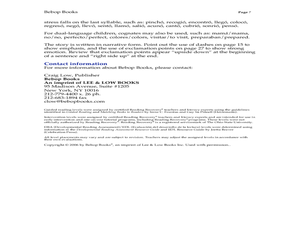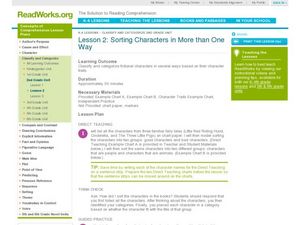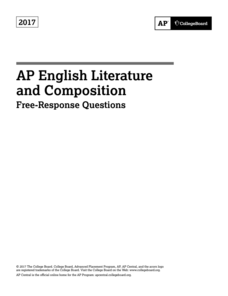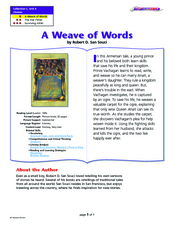National Endowment for the Humanities
Soviet Espionage in America
The war against Communism and Joseph McCarthy’s place in it are the focus of a series of three lessons examining postwar America from 1945-1950. This first lesson asks groups to read an introduction that describes the Verona Project and...
Curated OER
Guided Reading with Elizabeti's Doll
Practice reading strategies using Elizabeti's Doll by Stephanie Stuve-Bodeen. Readers utilize decoding and comprehension strategies before, during, and after reading the story. A detailed list of text features, high frequency words,...
University of North Carolina
Religious Studies
What is the difference between religion and religious studies? Readers find out after reading an online handout. It outlines common assignments in religious studies classes, such as critically evaluating religious texts and writing...
Curated OER
Sorting Characters in More Than One Way
Introduce your class to characterization. Familiar story characters are sorted into "good" and "bad" categories based on the characters' personalites and actions in the story. The class discusses and describes characters they have read...
K12 Reader
The Brown Cow in the Tower
Move toward mastery of -ow words with a quick worksheet. Learners read a poem that includes as many -ow words as possible and then respond to three included reading comprehension questions.
Super Duper Publications
WH Question Cards - Pro: Who, What, When, Where, Why
Do you have kids on your caseload with wh questions goals, that need extra practice comprehending and asking who, what, when, where, and why questions? Then this clever app is designed for you!
Fun in First
Help Your Child Become a Better Reader
Ensure that your learners can read both fiction and nonfiction texts with ease! This resource includes questions that individuals can ask themselves while reading either type of text to help learners comprehend the text, make...
Harper Collins
Parrot in the Oven: Response Journal
After completing Chapter 5 of Parrot in the Oven: Mi Vida, readers make text-to-self, text-to-text, and text-to-world connections to Victor Martinez's novel by crafting journal entries addressing comments and questions to characters in...
American Museum of Natural History
Ask a Scientist About Our Environment
Let's ask an expert! Scientists at the American Museum of Natural History field questions about the environment in an interactive resource. Question topics range from global warming and conservation to endangered species and habitats.
Southern Nevada Regional Professional Development Program
Reading Literature - The Ruin
Cross-comparison, the technique of focusing on two different texts with the same themes, motifs, events, etc., is employed in an exercise that asks groups to examine two different translations of “The Ruin,” a poem, written in Old...
Curated OER
Unwind: Pre-Reading Strategy, K-W-H-L
Readers of Neal Shusterman's young adult science fiction novel, Unwind, record what they know, what they want to know, how the will find answers to the questions, on a KWHL chart.
Central Bucks School District
Making Generalizations
Being able to recognize patterns, craft generalizations, and draw conclusions based on information in a text passage are essential critical thinking skills. Encourage learners to hone these skills with a worksheet that asks them to read...
Houghton Mifflin Harcourt
Nature: Friend and Foe: English Language Development Lessons (Theme 6)
If readers don't understand key portions of a text, it may seem more like a foe than a friend. The second resource in a series of three ESL lessons designed to accompany the texts in Nature: Friend or Foe makes the texts easier to...
K12 Reader
Inference in Literature: The Wizard of Oz
We're off to see the wizard! Practice making inferences in literature with two sample paragraphs from L. Frank Baum's The Wonderful Wizard of Oz. Each passage provides questions about the pleasantness of the place it describes, and...
West Corporation
Making Inferences – Use Your Mind to Read!
How can you tell if someone is happy? The lesson works with elementary and middle school scholars to activate their schema and pay attention to details to make inferences in their daily lives, poetry, and other literature. Cleverly...
Livaudais-Baker English Classroom
Lord of The Flies Chapter Questions
Chapter-by-chapter worksheets ask readers to find specific examples of characterization, symbolism, setting, conflict, themes, and main ideas in William Golding's Lord of the Flies. Also included in the packet is an assignment sheet that...
Dr. Seuss Enterprises
Read Across America
Celebrate the whimsical world of Dr. Seuss on Read Across America Day with a collection of science, technology, engineering, the arts, and mathematics activities, each linked to a popular Dr. Seuss story.
College Board
2017 AP® English Literature and Composition Free-Response Questions
Music brings back a memory. One prompt from the 2017 AP® English Literature and Composition Free-Response Questions asks scholars to read a poem and write essays analyzing the relationship between music and the author's memories. Two...
College Board
2003 AP® English Literature and Composition Free-Response Questions
The released 2003 AP® exam asks scholars to read and respond to two poems about the love god Eros. They also analyze the characterization and narrative in The Other Paris. A final essay question requires pupils to choose a novel or play...
Prestwick House
Rhetorical Devices in Political Speeches
Have you ever watched a political speech and felt your heart beat a little faster, and your opinion either solidify or begin to slightly change? Rhetorical devices can be a strong tool in an effective and powerful speech. A short lesson...
Curated OER
Giant Smelly Plant Attracts Thousands
Read and discuss a news article about a rare corpse plant that bloomed in Washington D.C. Because this native Indonesian plant blooms so rarely, people flock to see it. After reading the article, your class answers comprehension...
EngageNY
Continued Close Reading of Nasreen's Secret School: Discussions of Questions and Evidence
Third graders answer text-dependent questions of the story Nasreen's Secret School both independently and then collaboratively through using the carousel of questions strategy. This plan is the seventh instructional activity in a...
Curated OER
Determining Author's Point of View: The Sneeches
Determine the author's point of view in a text. Young readers read Dr. Seuss' The Sneeches and identify the author's purpose in the story. They identify persuasive techniques in writing, asking and answering questions to better...
Curated OER
A Weave of Woods
Focus on vocabulary, comprehension, and analysis while reading A Weave of Woods, a colorful picture book by Robert D. San Souci. Young learners use worksheets to preview, predict, practice paraphrasing, and make comparisons. The...

























